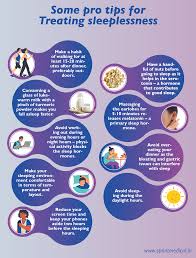Insomnia Treatment at Home
Insomnia, the inability to fall asleep or stay asleep, can significantly impact your quality of life. While there are various treatment options available, including medication and therapy, there are also effective home remedies that can help improve your sleep patterns. Here are some tips for treating insomnia at home:
Establish a Bedtime Routine
Creating a consistent bedtime routine can signal to your body that it’s time to wind down and prepare for sleep. Try to go to bed and wake up at the same time every day, even on weekends.
Create a Relaxing Sleep Environment
Your bedroom should be a peaceful and comfortable space conducive to sleep. Make sure your room is dark, quiet, and cool. Consider using earplugs or a white noise machine if noise is an issue.
Avoid Stimulants Before Bedtime
Avoid consuming stimulants like caffeine and nicotine in the hours leading up to bedtime. These substances can interfere with your ability to fall asleep and stay asleep.
Limit Screen Time Before Bed
The blue light emitted by screens can disrupt your body’s natural sleep-wake cycle. Try to avoid using electronic devices such as smartphones, tablets, and computers at least an hour before bedtime.
Practice Relaxation Techniques
Engaging in relaxation techniques such as deep breathing exercises, meditation, or gentle yoga before bedtime can help calm your mind and body, making it easier to fall asleep.
Maintain a Healthy Lifestyle
Eating a balanced diet, exercising regularly, and managing stress can all contribute to better sleep quality. Avoid heavy meals close to bedtime and aim for regular physical activity during the day.
If you continue to experience persistent insomnia despite trying these home remedies, it’s important to consult with a healthcare provider. They can help identify any underlying issues contributing to your sleep problems and recommend appropriate treatment options.
6 Effective Home Remedies to Combat Insomnia
- Establish a regular sleep schedule by going to bed and waking up at the same time every day.
- Create a relaxing bedtime routine, such as reading a book or taking a warm bath, to signal your body that it’s time to wind down.
- Make sure your bedroom is conducive to sleep by keeping it dark, quiet, and at a comfortable temperature.
- Limit exposure to screens (phones, TVs, computers) before bedtime as the blue light can disrupt your sleep cycle.
- Avoid caffeine and heavy meals close to bedtime as they can interfere with your ability to fall asleep.
- Incorporate regular exercise into your routine but avoid vigorous activity close to bedtime.
Establish a regular sleep schedule by going to bed and waking up at the same time every day.
Establishing a regular sleep schedule by going to bed and waking up at the same time every day is a crucial step in treating insomnia at home. Consistency in your sleep patterns helps regulate your body’s internal clock, making it easier to fall asleep and wake up naturally. By setting a fixed bedtime and wake-up time, you train your body to anticipate sleep and optimize the quality of your rest. This routine reinforces healthy sleep habits and can significantly improve your overall sleep quality over time.
Create a relaxing bedtime routine, such as reading a book or taking a warm bath, to signal your body that it’s time to wind down.
Creating a relaxing bedtime routine, like reading a book or taking a warm bath, can be a soothing way to signal to your body that it’s time to wind down and prepare for sleep. Engaging in calming activities helps shift your focus away from the day’s stressors and encourages relaxation, making it easier to transition into a restful night’s sleep.
Make sure your bedroom is conducive to sleep by keeping it dark, quiet, and at a comfortable temperature.
Ensuring that your bedroom is conducive to sleep is essential for combating insomnia. By maintaining a dark, quiet, and comfortable environment, you can create the ideal conditions for restful sleep. Darkness signals to your body that it’s time to rest, while minimizing noise disturbances can help you stay asleep throughout the night. Additionally, keeping the room at a comfortable temperature can promote relaxation and prevent disruptions in your sleep cycle. These simple adjustments can significantly improve your chances of falling asleep and staying asleep effectively.
Limit exposure to screens (phones, TVs, computers) before bedtime as the blue light can disrupt your sleep cycle.
Limiting exposure to screens, such as phones, TVs, and computers, before bedtime is crucial for improving sleep quality. The blue light emitted by these devices can interfere with the production of melatonin, a hormone that regulates sleep-wake cycles. By reducing screen time in the hours leading up to bedtime, you can help your body naturally wind down and prepare for restful sleep. This simple adjustment can have a significant impact on your ability to fall asleep easily and stay asleep throughout the night.
Avoid caffeine and heavy meals close to bedtime as they can interfere with your ability to fall asleep.
Avoiding caffeine and heavy meals close to bedtime is essential for improving your ability to fall asleep. Caffeine is a stimulant that can disrupt your sleep cycle and make it difficult to relax and drift off. Similarly, consuming heavy meals before bedtime can lead to indigestion and discomfort, making it challenging to achieve restful sleep. By being mindful of your caffeine intake and meal timing in the evening, you can create a more conducive environment for a peaceful night’s rest.
Incorporate regular exercise into your routine but avoid vigorous activity close to bedtime.
Incorporating regular exercise into your daily routine can be beneficial for improving sleep quality and overall well-being. However, it is important to avoid engaging in vigorous physical activity close to bedtime as it can stimulate your body and mind, making it harder to relax and fall asleep. Instead, aim to schedule your workouts earlier in the day to allow your body enough time to wind down before bedtime. By striking a balance between staying active during the day and giving yourself time to unwind in the evening, you can help promote better sleep patterns and combat insomnia naturally.




